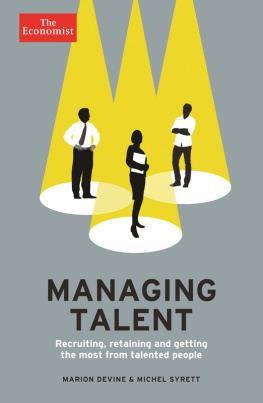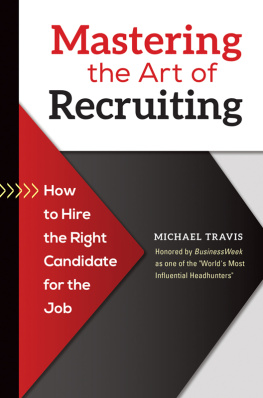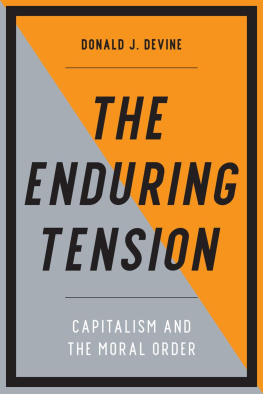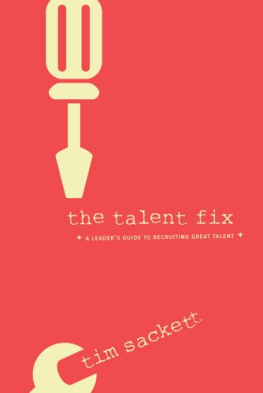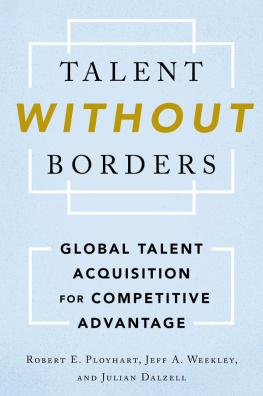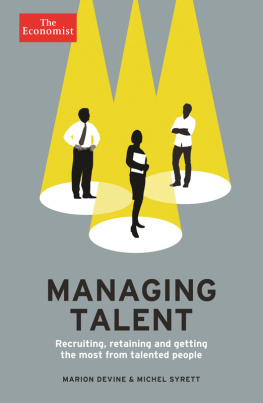Marion Devine - Managing Talent: Recruiting, Retaining, and Getting the Most From Talented People
Here you can read online Marion Devine - Managing Talent: Recruiting, Retaining, and Getting the Most From Talented People full text of the book (entire story) in english for free. Download pdf and epub, get meaning, cover and reviews about this ebook. year: 2013, publisher: PublicAffairs, genre: Business. Description of the work, (preface) as well as reviews are available. Best literature library LitArk.com created for fans of good reading and offers a wide selection of genres:
Romance novel
Science fiction
Adventure
Detective
Science
History
Home and family
Prose
Art
Politics
Computer
Non-fiction
Religion
Business
Children
Humor
Choose a favorite category and find really read worthwhile books. Enjoy immersion in the world of imagination, feel the emotions of the characters or learn something new for yourself, make an fascinating discovery.
- Book:Managing Talent: Recruiting, Retaining, and Getting the Most From Talented People
- Author:
- Publisher:PublicAffairs
- Genre:
- Year:2013
- Rating:3 / 5
- Favourites:Add to favourites
- Your mark:
- 60
- 1
- 2
- 3
- 4
- 5
Managing Talent: Recruiting, Retaining, and Getting the Most From Talented People: summary, description and annotation
We offer to read an annotation, description, summary or preface (depends on what the author of the book "Managing Talent: Recruiting, Retaining, and Getting the Most From Talented People" wrote himself). If you haven't found the necessary information about the book — write in the comments, we will try to find it.
Marion Devine: author's other books
Who wrote Managing Talent: Recruiting, Retaining, and Getting the Most From Talented People? Find out the surname, the name of the author of the book and a list of all author's works by series.
Managing Talent: Recruiting, Retaining, and Getting the Most From Talented People — read online for free the complete book (whole text) full work
Below is the text of the book, divided by pages. System saving the place of the last page read, allows you to conveniently read the book "Managing Talent: Recruiting, Retaining, and Getting the Most From Talented People" online for free, without having to search again every time where you left off. Put a bookmark, and you can go to the page where you finished reading at any time.
Font size:
Interval:
Bookmark:
MANAGING TALENT
OTHER ECONOMIST BOOKS
Guide to Analysing Companies
Guide to Business Modelling
Guide to Business Planning
Guide to Cash Management
Guide to Commodities
Guide to Decision Making
Guide to Economic Indicators
Guide to Emerging Markets
Guide to the European Union
Guide to Financial Management
Guide to Financial Markets
Guide to Hedge Funds
Guide to Investment Strategy
Guide to Management Ideas and Gurus
Guide to Managing Growth
Guide to Organisation Design
Guide to Project Management
Guide to Supply Chain Management
Numbers Guide
Style Guide
Book of Business Quotations
Book of Isms
Book of Obituaries
Brands and Branding
Business Consulting
Business Strategy
Buying Professional Services
Doing Business in China
Economics
Managing Uncertainty
Marketing
Marketing for Growth
Megachange the world in 2050
Modern Warfare, Intelligence and Deterrence
Organisation Culture
Successful Strategy Execution
The World of Business
Directors: an AZ Guide
Economics: an AZ Guide
Investment: an AZ Guide
Negotiation: an AZ Guide
Pocket World in Figures

MANAGING TALENT
Recruiting, retaining and getting the most from talented people
Marion Devine and Michel Syrett
The Economist in Association with Profile Books Ltd. and PublicAffairs
Copyright The Economist Newspaper Ltd, 2008, 2013
Text copyright Marion Devine and Michel Syrett, 2014.
First published in 2014 by Profile Books Ltd. in Great Britain.
Published in 2014 in the United States by PublicAffairs, a Member of the Perseus BooksGroup
All rights reserved.
Printed in the United States of America.
No part of this book may be reproduced, stored in or introduced into a retrieval system,or transmitted, in any form or by any means (electronic, mechanical, photocopying,recording or otherwise), without the prior written permission of both the copyrightowner and the publisher of this book, except in the case of brief quotations embodiedin critical articles and reviews. For information, address PublicAffairs, 250 West 57thStreet, 15th Floor, New York, NY 10107.
The greatest care has been taken in compiling this book. However, no responsibility can be accepted by the publishers or compilers for the accuracy of the information presented.
Where opinion is expressed it is that of the author and does not necessarily coincide with the editorial views of The Economist Newspaper.
While every effort has been made to contact copyright-holders of material produced or cited in this book, in the case of those it has not been possible to contact successfully, the author and publishers will be glad to make amendments in further editions.
PublicAffairs books are available at special discounts for bulk purchases in the U.S. bycorporations, institutions, and other organizations. For more information, please contactthe Special Markets Department at the Perseus Books Group, 2300 Chestnut Street, Suite200, Philadelphia, PA 19103, call (800) 810-4145, ext. 5000, or e-mail special.markets@perseusbooks.com.
Library of Congress Control Number: 2013955892
ISBN 9781-610393836 (HC)
ISBN 9781-610393843 (EB)
First Edition
10 9 8 7 6 5 4 3 2 1
To our partners Stephen and Suzy
Preface
IN APPROACHING THE RESEARCH and development of this book, the authors were aware that there is already a large body of material on talent management on the market.
Yet in conducting the research to assess this material, a number of factors stood out. First, in the grand scheme of things, talent management is a relatively new concept. It has been around for only about a decade and as a study by Heidrick & Struggles, a global executive search firm, discovered, the creation of specifically focused talent development functions and managers is still in its early stage (see ).
One consequence is that there is still no consensus about what talent management involves. As Angela Baron, formerly of the UK Chartered Institute of Personnel and Development, commented, it might or might not encompass a mixture of previously independent functions like graduate recruitment, performance management, career management and succession planning. Few of the new breed of talent managers are accountable directly to the chief executive or the senior executive team, and the level of integration between business and talent strategies is still patchy.
The other factor that stands out from interviewing people who are viewed as talented and/or have a track record of success in their chosen occupation is that there is a stark discontinuity between the agendas of the individual and that of the organisation. It can no longer be taken for granted by organisations that the individuals they mark out for systematic promotion and development are going to be willing pawns in the talent game created for them not least because that often involves a high degree of mobility and a long-term commitment to extended career plans.
Furthermore, narrowly defined demarcations about who is inside or outside the talent pool often exclude the very people organisations need to attract and retain at a time of volatility and uncertainty: aspiring entrepreneurs, mavericks, outsiders and specialists who do not seek or want a career ladder to a top corporate position, and who desire independence and autonomy.
All this poses considerable challenges to the senior managers who seek to recruit, retain and benefit from the skills and insights of talented people. This book seeks to highlight the dilemmas they face and, through reference to organisations with a proven track record of success, define and outline some of the emerging solutions. It also includes a chapter aimed at talented people themselves and how they can best approach the talent game at a time when the rules are significantly in flux.
Marion Devine and Michel Syrett
January 2014
The war for talent
All of us know that the calibre of talent distinguishes great from good, winners from losers and adaptation from extinction. Having the right team playing on the field is the fundamental difference between victory and defeat.
Indra Nooyi, chairman and chief executive, PepsiCo
SOME 15 YEARS AGO , McKinsey & Company, a global management consulting firm, produced a now famous report called The War for Talent. It made the case that international companies needed to pay as much attention to how they managed their brightest employees as they did any other corporate resource. McKinsey declared that better talent is worth fighting for and predicted a world where the supply of talent would decrease while demand would rise. Companies would be locked in a constant and costly battle for the best people for the foreseeable future.
McKinseys definition of talent went far beyond managerial or leadership skills:
[Talent is] the sum of a persons abilities his or her intrinsic gifts, skills, knowledge, experience, intelligence, judgment, attitude, character and drive. It also includes his or her ability to learn.
In response to economic boom times between 1998 and 2001, many firms expanded rapidly and the battle to recruit and keep the best people well and truly began. The talent management function, as well as a burgeoning talent management industry, sprang up to identify, retain and develop high-flying individuals into a small, exclusive top tier of managers and leaders.
Despite several cycles of economic boom and bust, as well as the worlds most severe economic crisis, the battle for talent continues. The competition for the best staff has broadened beyond senior leadership talent. Employers are struggling to recruit sufficient numbers of highly skilled people for a wide variety of managerial and specialist positions.
Next pageFont size:
Interval:
Bookmark:
Similar books «Managing Talent: Recruiting, Retaining, and Getting the Most From Talented People»
Look at similar books to Managing Talent: Recruiting, Retaining, and Getting the Most From Talented People. We have selected literature similar in name and meaning in the hope of providing readers with more options to find new, interesting, not yet read works.
Discussion, reviews of the book Managing Talent: Recruiting, Retaining, and Getting the Most From Talented People and just readers' own opinions. Leave your comments, write what you think about the work, its meaning or the main characters. Specify what exactly you liked and what you didn't like, and why you think so.

